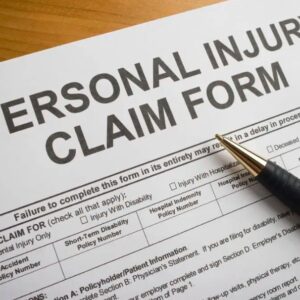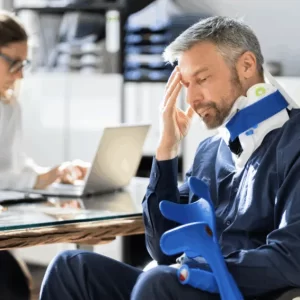Being hit by a car while walking is a terrifying experience. The aftermath can be overwhelming, leaving you with injuries, mounting medical bills, and questions about your rights. This list guides you through the essential steps to understand if you have a claim and how to maximise your chances of a fair settlement.
1. Understand Your Rights After a Pedestrian Accident
As a pedestrian, you have the right to safe passage. Drivers have a duty of care to watch out for pedestrians, obey traffic laws, and avoid causing harm. When they fail to do so, and you’re injured as a result, you may have grounds for a personal injury claim. The key is understanding that fault or negligence needs to be established.
2. Establish Negligence in Your Pedestrian Accident Case
Negligence is the legal term for carelessness. To win a claim, you need to prove the driver was negligent and that their negligence directly caused your injuries. Here’s what that generally means:
- Duty of Care: The driver had a legal responsibility to exercise reasonable care towards you.
- Breach of Duty: The driver failed to meet that responsibility. Examples include speeding, running a red light, driving under the influence, or distracted driving (like texting).
- Causation: The driver’s breach of duty directly caused your accident and injuries.
- Damages: You suffered actual damages as a result of your injuries (medical bills, lost wages, pain, and suffering).
3. Gather Evidence to Support Your Claims
Evidence is the bedrock of your claim. The stronger the evidence, the better your chances of success. Key pieces of evidence include:
- Police Report: Request a copy immediately. It contains crucial details, including the officer’s assessment of the accident, witness statements, and citations issued.
- Photographs: Take photos of the accident scene, including vehicle damage, your injuries, traffic signals, and any obstructions to visibility.
- Witness Information: Get the names and contact details of any witnesses. Their accounts can be invaluable.
- Medical Records: Keep detailed records of all medical treatment, including doctor’s notes, hospital bills, and therapy records.
- Personal Notes: Document everything you remember about the accident, including the time of day, weather conditions, and what the driver said.

Example of a successful claim through evidence: Consider a case where a pedestrian was hit in a crosswalk. The police report initially blamed the pedestrian for crossing against the light. However, a nearby security camera’s footage, obtained by the pedestrian’s lawyer, showed the driver speeding through a red light. This video evidence completely shifted the blame and led to a favourable settlement for the injured pedestrian.
4. Seek Immediate Medical Attention & Document Injuries
Your health is paramount. See a doctor as soon as possible, even if you think your injuries are minor. Some injuries, like whiplash or internal bleeding, might not be immediately apparent. Prompt medical attention also creates a record linking your injuries to the accident. Keep detailed records of all medical appointments, treatments, and medications.
5. Calculate All Your Damages: Beyond Medical Bills
Damages go beyond just your medical expenses. You’re entitled to compensation for all losses resulting from the accident. These can include:
- Medical Expenses: Past and future medical costs, including hospital stays, doctor’s visits, physical therapy, and medication.
- Lost Wages: Compensation for lost income due to your injuries, including sick leave, vacation time, and potential future earnings.
- Pain and Suffering: Compensation for the physical pain and emotional distress caused by the accident. This is often calculated based on the severity of your injuries and the impact on your life.
- Property Damage: If any personal belongings were damaged in the accident (e.g., phone, glasses), you can claim for their repair or replacement.
- Care Costs: If you need assistance with daily tasks like cooking, cleaning, or personal care, you can claim for the cost of hiring help.
6. Navigate Insurance Claims and Negotiations
Dealing with insurance companies can be tricky. They are often focused on minimising payouts. Here are some key points to keep in mind:
- Report the Accident: Notify your own insurance company and the driver’s insurance company as soon as possible.
- Avoid Giving a Recorded Statement: You are not obligated to give a recorded statement to the other driver’s insurance company. It’s best to speak to a lawyer first.
- Don’t Accept the First Offer: Insurance companies often make low initial offers. Be prepared to negotiate.
- Document Everything: Keep a record of all communication with the insurance company, including dates, times, and the names of the people you spoke with.

Common Defences from Insurance Companies:
- Contributory Negligence: They might argue you were partially at fault for the accident (e.g., jaywalking). In many jurisdictions, if you are found to be even partially at fault, your compensation can be reduced proportionally.
- Pre-Existing Condition: They may claim your injuries are due to a pre-existing condition rather than the accident.
- Exaggerated Injuries: They might dispute the severity of your injuries or claim you are exaggerating your pain and suffering.
7. Hire a Pedestrian Accident Lawyer to Maximise Your Claim
A qualified pedestrian accident lawyer can be your greatest asset. They understand the law, know how to build a strong case, and can negotiate effectively with insurance companies. Here’s why you should consider hiring one:
- Expertise: They have experience handling similar cases and understand the complexities of personal injury law.
- Negotiation Skills: They can negotiate with insurance companies on your behalf to get you the maximum compensation you deserve.
- Investigation: They can investigate the accident, gather evidence, and interview witnesses to build a strong case.
- Court Representation: If a fair settlement cannot be reached, they can represent you in court.
- Peace of Mind: They can handle the legal aspects of your case, allowing you to focus on recovering from your injuries.
Finding the Right Lawyer:
- Referrals: Ask friends, family, or colleagues for recommendations.
- Online Research: Look for lawyers who specialise in pedestrian accidents and have positive reviews.
- Consultations: Schedule consultations with several lawyers to discuss your case and see if they are a good fit.
- Contingency Fees: Most pedestrian accident lawyers work on a contingency fee basis, meaning you only pay them if they win your case.
8. Understand the Statute of Limitations
Every jurisdiction has a statute of limitations, which sets a deadline for filing a lawsuit. If you miss this deadline, you lose your right to sue. These time limits differ depending on your location. For example, in England and Wales, the time limit for most personal injury claims is three years from the date of the accident or the date of knowledge of the injury, while in Scotland, the time limit is generally three years from the date of the injury. It’s vital to consult with a lawyer to determine the specific statute of limitations in your case.
9. The Role of Expert Witnesses
In some pedestrian accident cases, expert witnesses can play a crucial role. These experts can provide testimony on various aspects of the case, such as:
- Accident Reconstruction Experts: They can recreate the accident to determine how it occurred and who was at fault.
- Medical Experts: They can testify about the nature and extent of your injuries, the necessary medical treatment, and your prognosis.
- Economic Experts: They can calculate your lost wages and future earning potential.
10. Be Patient and Persistent
Personal injury claims can take time to resolve. Be patient and persistent throughout the process. Stay in contact with your lawyer, provide them with any new information or evidence, and follow their advice.
By following these ten steps, you can navigate the aftermath of a pedestrian accident, protect your rights, and maximise your chances of receiving fair compensation for your injuries and losses. Remember, seeking legal advice is crucial to ensuring your rights are protected.




It¦s really a nice and useful piece of information. I am happy that you just shared this useful information with us. Please stay us up to date like this. Thanks for sharing.